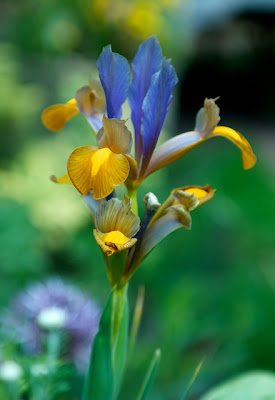Over the last few days my attention has been drawn to small things. In part I have David Attenborough’s current enthralling TV series Frozen Planet to thank for this. This week we could view, miraculously: tiny polar bear cubs born to a mother half asleep in the midst of the brutal Arctic winter finding their way to suckle on milk nine times richer than the human variety; starfish failing to escape a deadly column of salinated ice snaking down to their previously secure habitat; a fragile emperor penguin chick being cradled in its father’s feet and so kept away from contact with icy ground that would kill it in seconds. There are many miracles here: the sights themselves, of course, but also what goes on behind the lens in the accumulated ingenuity and determination of the film crews, the technology required to brings us the images and transport the crews to achingly remote and hostile environments.
Yesterday, I went to my places of work, St Olave Hart Street and St Katharine Cree (both in the City of London), for the first time since my recent treatment. My main destination was St Katharine’s on this occasion, of which more in a moment, but I called in first to St Olave’s, mainly because I love it. One of the few mediaeval churches left in the City, it is a place that rarely fails to touch those who enter it from the mad rush going on outside. Rehearsal was under way for one of the musical recitals that have taken place there at least twice a week for over 50 years, the acoustic enabled by the 15th-century stone interior and 20th-century wooden ceiling (as well as some now rather tired carpet) being quite peerless. The trio performing were a bit out of the ordinary as their performance would include elements of improvisation, including an invitation to the audience to submit their mobile ringtones, on which the group would then create musical variations. The micro builds the macro.
On then to St Katharine Cree for her Patronal Festival, the annual celebration of the saint. St Katharine of Alexandria was a scholar in the 4th century and, in recognition of her status, the address at the Patronal Festival traditionally focusses on the meeting place of faith and intellect. The speaker this year was Andrew Briggs, Professor of Nanomaterials at Oxford University, who treated us to a lightning summary of his work, which is aimed at assembling and arranging infinitesimally small components for use ultimately in quantum computing. This is bleeding-edge science and a practical quantum computer—incomparably faster than current digital computers—is some years off (say 10, for the sake of putting some sort of figure on it). His title was “Your God Is Not Small Enough”, encouraging us to see God as concerned and involved with the small, often hidden, details of our lives, just as He is with the great things: the World, the Universe, Space etc. It is in the outworking of small decisions and behaviours that our life is built. Heady stuff, not least because it came with the authority of a man who has spent over 30 years studying the tiniest of structures and I fear that I am not beginning to do his fine talk justice. The micro builds the macro.
 |
| St Katharine Cree on a previous occasion. Architecturally unique in London, the present building was consecrated in 1631 by Archbishop Laud, whose conduct of the consecration liturgy–small actions in the fabric of one day–was used by his enemies to help build a case of crypto-Catholicism against him and so led to his execution. Photo by Esperey |
I made a small purchase earlier in the week: highlighters with which to mark up the texts I read to research the historical figure on whom I plan to base my fiction. Will this micro build a macro?


No comments:
Post a Comment